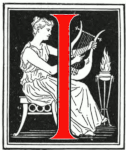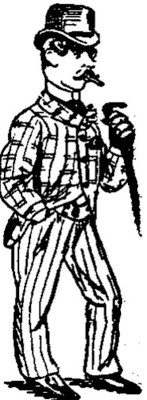This article has been transcribed from a copy of the Cardiff Times in the online collection of scanned Welsh newspapers 1804-1919 in the National Library of Wales, with grateful recognition of the free access accorded to all readers. A decorative initial has been added.
Explanatory Notes
'little tin Heaven': this phrase occurs in a poem quoted in an article, 'Is Marriage a Failure?', in the Observer of Auckland (NZ), where it is, reprinted from the Detroit Free Press, and various other US papers. The phrase or the complete poem may have been popularly known as a recitation piece or as the lyric for a song. 'Tin' as an epithet noun, has the sense of 'cheap, mass-produced substitute for the real thing'.
'Worcester sauce marketed' has been marketed by Lea and Perrins of Worcester since 1837.
The American writer who said 'They would sooner have an old ruin in their front garden than a thousand dollars fountain', has not been traced, and may be Samuel's invention.
The second illustration depicts a 'conceited' nursemaid. It had been a subject of comment since 1860 that certain women servants were dressing to all appearances as well as their mistresses. —— David Skilton

think it may be taken for granted that all people are more or less conceited with themselves. Why this should be so is a problem worthy of a philosopher or a scientific investigator. The development of conceit is gradual, and may be traced as easily in the child as in the up-grown person.
Children are invariably conceited by the time they arrive at such an age that they can in their infantile way appreciate their surroundings. They are conceited about their clothes, their last new toy, and their personal appearance.

Infant Conceit
See a child with a new frock on, and you will find conceit in its most advanced forms in its every movement. It will, to the best of its ability, affect they ways of its elders, and will strut about with an air of conscious superiority worthy of the proverbial peacock.
As juvenile girls are far more conceited than boys, and your three or four years-old lady will give a decided opinion as to the colour which suits her best, and give her nurse an infantile lesson on the way her hair should be dressed or the manner in which the bows on her dress should be tied.
Unless this conceit be 'knocked out' of children as soon as it is found to exist, it will develop into priggishness and rudeness, and will make an otherwise pleasant child a nuisance to everybody.
Force of example has much to do with the habits of children, and it frequently happens that the conceit displayed in infancy is the result of unconscious imitation.
Given a conceited maid or nurse, and it is certain that the children in the charge will ape their tricks and become conceited also.

Conceited Nurse
Girls who, growing up, find they are possessed of more personal beauty than their sisters, are certain to become conceited, and it needs but the admiration of the sterner sex to bring out the full of their conceit.
This is the stage when, to use a vulgarism, they begin 'to fancy' themselves, and they go about the world with a 'touch-me-not' air about them that is positively sickening.
As a sort of penance for their sins of conceit, into unfrequently happens that they are left upon the shelf, while their less conceited and more sensible sisters become wives and mothers while they are vainly trying to find a husband on whom they can condescend to shed the light of their conceited nature.

Aristocratic Conceit
All men dislike conceited women and if girls but knew it, the very 'side' they are so careful to preserve only acts as a finger post to warn the men that they had better keep their distance.
Girls of this kind are generally looked upon by men in the same way that they look upon specimens in museums to which are affixed a 'Do not touch' label. They are things to admire at a respectful distance but not to live with. There are no people so conceited as the owners of blue blood, they live in a 'little tin Heaven' of their own, and would as soon think of mixing with the common herd as of substituting strychnine for Worcester sauce at their tables.
They glory in the fact that their ancestors did big things years before they were born or thought of, and they show you with conscious pride pictures of the said people in costumes suggestive of the last degree of discomfort.
It does not matter if the owners of the pictures are as poor as church mice, (I wonder how poor church mice really are?) they still go about with the conceited noses high in the air, as though they were very condescending to live at all.
These are the sort of people of whom an American writer once said:-- 'They would sooner have an old ruin in their front garden than a thousand dollars fountain.' And he was perfectly right. And, after all, what have they to be conceited about? Their having ancestors is, as it were, their misfortune and not their fault, and they are, after all their conceit, no better than anybody else. Adam was the first ancestor of all, and no one man or woman is one whit the better because he or she belongs to what they call 'an old family.'

Conceit of Another Shape
Of harmless, if objectionable, conceit there is plenty to be found in ever-day life, and in this connection men are as bad as women.
Some men are conceited about their personal appearance, and I have known an otherwise sensible man waste half-an-hour in the morning over the arrangement of his moustache. Such conceit is idiotic to a degree.
Conceit as to the cut of a suit is of common occurrence, and many a tailor has had a suit returned for the simple reason that it did not quite come up to the faddism of a conceited customer. Conceit in any form is a waste of time for it does the owner of it no good and is a great source of disgust and annoyance to the public who are compelled to come in contact with its possessor.
Last modified 29 April 2022